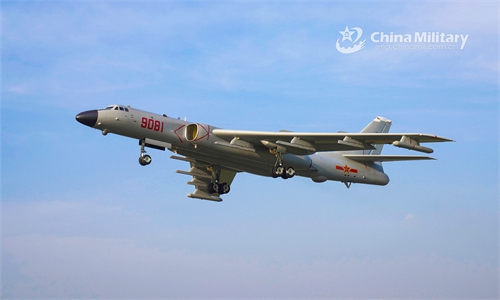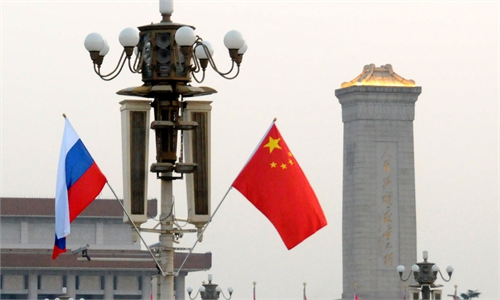
Illustration: Liu Rui/GT
The air forces of China and Russia held their second joint aerial strategic patrol over the Sea of Japan and the East China Sea on Tuesday. The two countries carried out their first such patrol in July 2019.
This exercise fully displays further developments of their comprehensive strategic partnership coordination for a new era. The two joint aerial patrols indicate the concern and attention over this region's strategic stability to both countries.
Some outside countries led by the US have repeatedly interfered and incited frictions, posing a major threat to peace in the region.
Military coordination between Beijing and Moscow aims to maintain strategic stability in the region, which is merely a tactical cooperation, not aimed at any particular third parties. Any misinterpretations or exaggerations of these patrols are unnecessary.
The China-Russia comprehensive strategic partnership for a new era lies in the two countries' ability to work closely in domains such as security. These patrols are similar to fire drills with regards to safety training, and should not be viewed as any malicious intent.
Beijing and Moscow have reiterated that the patrol was part of their annual military cooperation plan without targeting any third party. Meanwhile, the operation has drawn the attention of various countries, who expressed concern. Both Tokyo and Seoul sent jets to escort Chinese and Russian aircraft. When the first such patrol took place in July 2019, Tokyo and Seoul reacted with strong responses.
Observers should take note that China and Russia are powers that maintain stability in the region, rather than destroy the strategic balance.
US-led countries from faraway corners of the world are the ones who are actually jeopardizing regional stability with outside agitation. Those countries deploy anti-missile systems, and their military alliance is a crucial factor that leads to instability in the region.
China and Russia, who are not military allies, don't threaten regional stability or deploy anti-missile systems. The two regional powers' operation can be understood as a response to moves that might destabilize the region.
Some analysts think China and Russia are using joint aerial patrols as a strong response to US' hostile sanctions. Such opinion makes sense.
China and Russia, both as major powers in the Asia-Pacific region, long for a peaceful and stable environment that will benefit their development. As COVID-19 pandemic continues to ravage the world, the international situation is still in a turbulent period. Instead of putting the pandemic under control, some US-led Western countries have politicized the pandemic and resorted to unilateral and conservative postures to target China and Russia, escalating tensions. They also interfered in the internal politics of China and Russia, aiming to drive wedges between the two countries and their neighbors. They pointed an accusing finger at Beijing and Moscow from ideological and national security stances. They even have gone so far as to try to form a NATO-like military alliance in Asia.
Against this backdrop, it is now urgent for China and Russia to strengthen strategic coordination in all aspects and cope with the unfavorable and unstable situation.
The China-Russia joint aerial strategic patrol also signals to the world that the two countries are the linchpins of peace and stability in the Asia-Pacific region and Eurasia. They have no intention to challenge the regional order. They are propelled to respond to external powers which threaten regional security.
The author is an associate research fellow at the Institute of Russian, Eastern European and Central Asian Studies under the Chinese Academy of Social Sciences. opinion@globaltimes.com.cn


